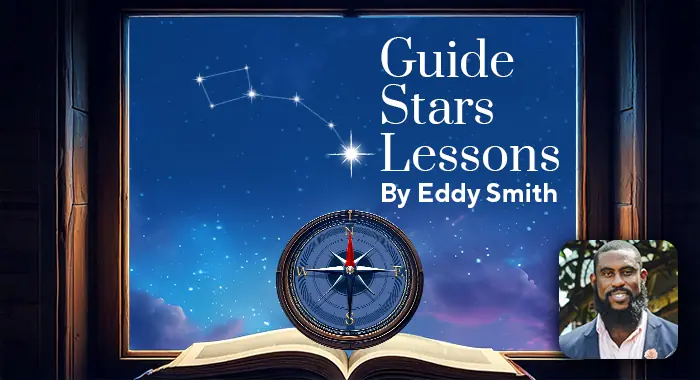Guide Stars Lessons: No Church in the Wild?
“If you can’t go to heaven, don’t force.”
My uncle would say it with a chuckle, quoting some old head from the block. I remember hearing it as a child and laughing, not because I understood it, but because the room always erupted with a kind of knowing amusement. It felt like a punchline wrapped in gospel. Only years later did I start to feel the weight behind those words, maybe the statement was challenging something deeper, and it forced me to ask the bigger question: what does it really mean to live right?
I often wondered whether morality was something we could opt into or out of… like a lifestyle plan. Could someone live an honest life, mind their business, obey the law, and still be considered “good” without ever kneeling in a church or calling on God? Is there a path in life where we can be upstanding citizens without the burdens of selflessness, charity, and moral accountability that faith often demands? Or does goodness (the kind that counts) require more than just staying out of trouble?
I believe in God, not just the idea of Him, but the logic. Order, creation, conscience. None of that feels accidental to me. But belief doesn’t mean I don’t have questions. Sometimes I have to challenge the shape of what I believe, just to understand the core of it.
If all our laws vanished tomorrow, would people still be kind? And if someone doesn’t believe in heaven, does that automatically mean they’ve chosen the wild?
Some say morality is written on the heart. Others believe it’s carved into stone tablets. What if it’s just an agreement, a social contract we all silently sign so that we can coexist WITHOUT BURNING EVERYTHING to the ground? Don’t kill. Don’t steal. Don’t sleep with your neighbour’s spouse. Not just because God said so, but because chaos is bad for business?
That idea unsettles some people. It feels cold, even godless. But isn’t it worth asking: if we only do good because we fear hell or crave heaven, is that truly moral? Or is it just spiritual insurance? And if we live decently without ever praying, tithing, or repenting, are we still somehow unclean in the eyes of the faithful? I know the Bible says all our righteous acts are like filthy rags. Without God, even our best falls short. But let’s be honest, most of us would rather live next to an atheist with basic human decency than a believer who is self-righteous, dishonest, or impossible to live with. These are solid questions, the kind good people swallow to avoid being branded lost or lukewarm.
Maybe that’s why the phrase “no church in the wild” doesn’t feel like someone raging against religion. It feels like someone who’s stopped expecting it to show up. Not rebellion, just the harsh reality that out here… you’re on your own.
Because in the wild, the rules are different. Not absent, just rewritten. The pulpit is replaced by survival. Praise songs give way to silence or gun shots and police sirens. People don’t always turn the other cheek. Sometimes they turn cold. But even there, in those shadow places; the broken homes, the rough corners, the forgotten margins, you’ll find loyalty, sacrifice, and strange, stubborn forms of grace. It makes you wonder if morality is something sacred that trickles down from heaven, or something scarred and stitched together by people who never had the luxury of religion but still chose not to become monsters.
Maybe, just maybe the real danger is not “losing faith,” but assuming we own it. Assuming that God only shows up where He has been invited. That He only dwells among the saved, only moves through polished hands and practiced prayers. But what if God walks through the wild too? What if He has been there all along, not preaching but listening, not judging but empathising (entering our pain), not absent but disguised as the man with nothing who still gives, or the woman with no religion who still loves?
To its credit, the church has done real good. That needs to be said. It’s kept some people sane, sober, and alive. It’s been a place to grieve, to start over, to belong. But it’s also gotten things wrong. At times it’s been too political, too proud, too out of touch. Too interested in appearances while real people were falling apart just outside the gate. Still, despite the failures, it has shown up. And in a world full of places that don’t care enough to try, maybe that still matters.
Maybe that’s what unsettles us the most, not that people live without “God” (or religion), but that some of them still live well. That they are kind, patient, brave, disciplined, even when there’s no doctrine propping them up. And it makes you wonder, not whether God is real, but whether we’ve misunderstood how He shows up. Maybe He’s not just found in the rituals we repeat, but in the instincts we can’t explain. The pull toward decency, The ache for justice, The guilt that keeps us awake. Maybe it all comes from somewhere. Maybe even those who never called His name are shaped by it. Not because they believe, but because they were born.
I don’t know what makes a person righteous. I’ve seen too many contradictions to pretend it’s simple. But I know this, not everyone who does good believes in God (or religion), and not everyone who believes in God does good. Maybe righteousness isn’t proven by worship or washed away by doubt. Maybe it’s revealed in what you choose when there’s nothing to gain. If that kind of goodness exists, then it matters. Whether it came from heaven or somewhere harder to name, we’d be fools to ignore it.



